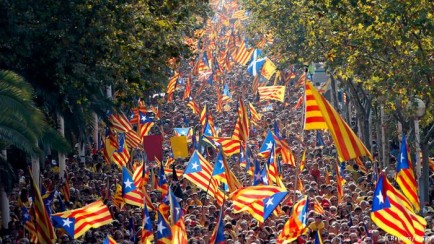
Many Catalans have long yearned for independence, but progress, particularly politically, has been stunted at every turn.
Catalonia’s government has said that it will press ahead with efforts to break away from Spain, with or without approval from the Spanish government.
The war of words that has shaped the debate for many years has intensified this week, with Catalonia willing to defy Spain’s constitutional court by openly discussing its own claims to sovereignty. Just nine months ago the Catalan parliament outlined a resolution designed to begin the process of the creation of an independent state, but found that their requests fell repeatedly on deaf ears in Madrid…
“The Spanish state has left us feeling that we just don’t have an alternative,” said Raül Romeva, Catalonia’s minister of foreign affairs. “We have always said that we would have preferred a Scottish-style scenario, where we could negotiate with the state and hold a coordinated and democratic referendum. We keep talking to Madrid, but all we get back from them is an echo.”
Madrid is eager to avert the potential of a break up of Spain, and has looked on nervously at the recent Brexit decision – fearful that a rebuffed Scotland will press for another referendum on independence from the UK, a referendum it is likely to win.
Romeva all but issued an ultimatum to Madrid, saying that the national government can carry on what it is doing – which is “denying reality in the belief that it can use the constitutional court and legal processes to stop it” – or it can accept the reality and inevitability of Catalan independence.
A recent poll held across Catalonia found that the majority of would-be voters are in favour of an independent Catalonia, and the incumbent Catalan government has taken measures to draft workable tax collecting departments, social security apparatus and a foreign affairs department in readiness for independence.
Romeva expects to see another independence referendum called within the space of a year, and believes that Madrid has a “democratic responsibility to accept the will of the majority of Catalans”.
Madrid’s stance remains resolutely simple: because Catalonia is not its own nation, any referendum vote it holds is not legally binding in any Spanish or EU court – an impasse that Catalans are determined to break.
“Catalonia is and will be an ally of Spain for obvious reasons of markets and infrastructure, as well as cultural and linguistic reasons,” Romeva concluded. “Europe wouldn’t want to lose such an economically and socially dynamic reality. So this unthinking assumption that an independent Catalonia would be kept out [of the EU] is false.”
 en
en



 Vlaams-Nederlands
Vlaams-Nederlands
0 Comments
Leave a Comment
DISCLAIMER
The opinions and comments expressed by contributors to this Blog are theirs alone and do not necessarily reflect the views of VIVA Homes Under the Sun Ltd, any of its associated companies, or employees; nor is VIVA to be held responsible or accountable for the accuracy of any of the information supplied.
Have you got something to say?